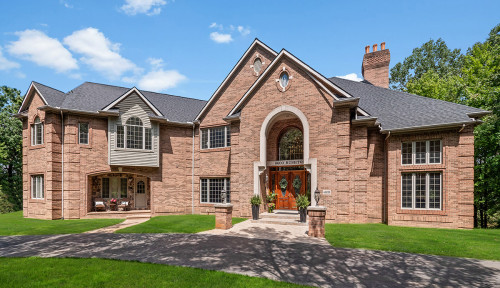








Rushton Recovery
Verified Center
This provider's information has been quality-checked by Recovery.com's Research Team for accuracy and completeness, including center verification through appropriate third-party organizations.
Treatment Focus
This center treats substance use disorders and co-occurring mental health conditions. Your treatment plan addresses each condition at once with personalized, compassionate care for comprehensive healing.
Primary Level of Care
Offering intensive care with 24/7 monitoring, residential treatment is typically 30 days and can cover multiple levels of care. Length can range from 14 to 90 days typically.
Treatment Focus
This center treats substance use disorders and co-occurring mental health conditions. Your treatment plan addresses each condition at once with personalized, compassionate care for comprehensive healing.
Primary Level of Care
Offering intensive care with 24/7 monitoring, residential treatment is typically 30 days and can cover multiple levels of care. Length can range from 14 to 90 days typically.
Provider's Policy
We strive to make our services accessible to those in need and accept various insurance plans. We are in network with BlueCross BlueShield and Blue Care Network. Our team can help you navigate the insurance process and find the best payment options for your treatment. We do NOT accept Medicaid/Medicare.
Rushton Recovery
Rushton Recovery
About Rushton Recovery
Rushton Recovery in South Lyon, Michigan, is a sanctuary for those battling addiction. This luxurious 30-acre retreat provides a continuity of care for substance use disorders and co-occurring mental health conditions. Rushton Recovery’s programs seamlessly integrate science-backed methods with whole-person wellness, providing compassionate care through tailored therapies. Designed to accommodate diverse needs, the center offers flexible programs for executives maintaining professional commitments, allowing each individual to receive the support they need for lasting recovery.
Personal, Compassionate Care
Clients begin their recovery process with Rushton Recovery’s medical director, who oversees the clients addiction assessment and physical evaluation. Medically supervised detox and medication-assisted treatment (MAT) will be provided as needed. Next, a biopsychosocial assessment is completed with Rushton’s clinical director in order to begin customizing each client's personal addiction treatment plan.
Evidence-Based, Intensive Treatment
Rushton Recovery provides a variety of evidence-based therapies, including cognitive behavioral therapy (CBT) and dialectical behavioral therapy (DBT). These therapies are provided in group and individual settings. Group therapy at Rushton Recovery includes process groups, psychoeduction groups, relapse prevention planning as well as family
therapy as requested.
Enhanced Overall Wellbeing
Clients at Rushton Recovery enjoy multiple wellness therapies for whole-person care. They can start their day with invigorating recovery yoga, a workout guided by a NASM-certified personal trainer in the fitness center or a hike on over 1.25 miles of trails located throughout the 30 acre property. Nutritious meals crafted by an executive chef nourish their bodies, while the therapeutic greenhouse and multiple firepits provide spots to unwind under the stars. Friendly competition can be found on the indoor basketball and pickleball courts, or clients can simply relax in the library or recreation room. With on site massages and holistic wellness consultations, Rushton Recovery creates a supportive environment where clients can embrace a healthier future.
Highlights from the Center
Highlights
These highlights are provided by and paid for by the center.
Joint Commission Accredited
Perfect for Professionals
Private Rooms Available
Tech Friendly
All Services On-Site
Center Overview
Treatment Focus
This center treats substance use disorders and co-occurring mental health conditions. Your treatment plan addresses each condition at once with personalized, compassionate care for comprehensive healing.
Joint Commission Accredited
The Joint Commission accreditation is a voluntary, objective process that evaluates and accredits healthcare organizations (like treatment centers) based on performance standards designed to improve quality and safety for patients. To be accredited means the treatment center has been found to meet the Commission's standards for quality and safety in patient care.
Recently helped 1 person via Recovery.com

Rushton Recovery
Recently helped 1 person via Recovery.com
Insurance Accepted
Cash Pay Rates
Estimated Cash Pay Rate
Center pricing can vary based on program and length of stay. Contact the center for more information. Recovery.com strives for price transparency so you can make an informed decision.




Recovery.com Verified Listing
Recovery.com verified that the name, location, contact information and license to operate for this treatment provider are valid and up-to-date.

Licensed by Michigan

The Joint Commission
Recovery.com is an independent, third-party mental health resource. Verification does not imply endorsement and does not guarantee the quality of treatment services.
Meet Your Care Team

Dr. Khatiwala
Medical Director

Nicholas Weiss
Clinical/Program Director
MSW

Donna Major
Director of Nursing
RN

Erin Masek
Health & Wellness Coach and Communications Director
IAP Certified Life Coach, AFPA Certified Nutrition Consultant, and NASM Certified Personal Trainer
Your Care Options
Specializations
Executives
Executive treatment programs typically directly support the needs of people who manage businesses and may provide flexible schedules and office space to allow work during treatment.
Professionals
Busy, high-ranking professionals get the personalized treatment they need with greater accommodations for work, privacy, and outside communication.
Who We Treat
Executives
Executive treatment programs typically directly support the needs of people who manage businesses and may provide flexible schedules and office space to allow work during treatment.
Men and Women
Men and women attend treatment for addiction in a co-ed setting, going to therapy groups together to share experiences, struggles, and successes.
Professionals
Busy, high-ranking professionals get the personalized treatment they need with greater accommodations for work, privacy, and outside communication.
Treatment Services
Detox
Detox fully and safely removes toxic substances from the body, allowing the next steps in treatment to begin with a clean slate.
Residential
In a residential rehab program, patients live onsite, with access to daily treatment and 24-hour care. An average stay is 30-90 days.
Approaches
Evidence-Based
A combination of scientifically rooted therapies and treatments make up evidence-based care, defined by their measured and proven results.
Holistic
A non-medicinal, wellness-focused approach that aims to align the mind, body, and spirit for deep and lasting healing.
Individual Treatment
Individual care meets the needs of each patient, using personalized treatment to provide them the most relevant care and greatest chance of success.
Therapies
1-on-1 Counseling
Patient and therapist meet 1-on-1 to work through difficult emotions and behavioral challenges in a personal, private setting.
Mindfulness Therapy
This ancient practice can be mental, emotional, and even spiritual. In meditation, you focus your attention on the present moment without judgement.
Art Therapy
Visual art invites patients to examine the emotions within their work, focusing on the process of creativity and its gentle therapeutic power.
Family Therapy
Family therapy addresses group dynamics within a family system, with a focus on improving communication and interrupting unhealthy relationship patterns.
Massage Therapy
Massage therapy relieves physical and emotional tension, reduces pain, promotes relaxation, and improves emotion regulation.
Medication-Assisted Treatment
Combined with behavioral therapy, prescribed medications can enhance treatment by relieving withdrawal symptoms and focus patients on their recovery.
Music Therapy
Singing, performing, and even listening to music can be therapeutic. Music therapy sessions are facilitated by certified counselors.
Conditions We Treat
Anxiety
Anxiety is a common mental health condition that can include excessive worry, panic attacks, physical tension, and increased blood pressure.
Depression
Symptoms of depression may include fatigue, a sense of numbness, and loss of interest in activities. This condition can range from mild to severe.
Post Traumatic Stress Disorder
PTSD is a long-term mental health issue caused by a disturbing event or events. Symptoms include anxiety, dissociation, flashbacks, and intrusive thoughts.
Substances We Treat
Alcohol
Using alcohol as a coping mechanism, or drinking excessively throughout the week, signals an alcohol use disorder.
Benzodiazepines
Benzodiazepines are prescribed to treat anxiety and sleep issues. They are highly habit forming, and their abuse can cause mood changes and poor judgement.
Co-Occurring Disorders
A person with multiple mental health diagnoses, such as addiction and depression, has co-occurring disorders also called dual diagnosis.
Cocaine
Cocaine is a stimulant with euphoric effects. Agitation, muscle ticks, psychosis, and heart issues are common symptoms of cocaine abuse.
Drug Addiction
Drug addiction is the excessive and repetitive use of substances, despite harmful consequences to a person's life, health, and relationships.
Ecstasy
Ecstasy is a stimulant that causes intense euphoria and heightened awareness. Abuse of this drug can trigger depression, insomnia, and memory problems.
Heroin
Heroin is a highly addictive and illegal opioid. It can cause insomnia, collapsed veins, heart issues, and additional mental health issues.
Methamphetamine
Methamphetamine, or meth, increases energy, agitation, and paranoia. Long-term use can result in severe physical and mental health issues.
Languages
Aftercare
Care Designed for Your Needs
Personal Amenities
Amenities
Special Considerations
Executive Program
Addiction and mental health treatment for executives typically involves high discretion, greater technology access, and more private, 1-on-1 care.
Activities
Yoga
Yoga is both a physical and spiritual practice. It includes a flow of movement, breathing techniques, and meditation.
Recently helped 1 person via Recovery.com
Learn More About the Center
Family Support Groups for Addiction
Discover how family support groups can empower loved ones to navigate the challenges of addiction together.
Methadone vs. Suboxone
Explore the key differences between methadone and Suboxone to understand which treatment option may be more effective.
Facts about Fentanyl
Learn essential facts about fentanyl that highlight its dangers, prevalence, and impact on the ongoing opioid crisis.
Alcohol Use Disorder
Uncover the signs, symptoms, and treatment options for alcohol use disorder to better understand this complex condition.
What people are saying
Treatment
5.0
Accommodations
5.0
Food & Nutrition
4.9
Value
5.0
Pros
- Beautiful Location (3)
- Supportive Aftercare (3)
- Luxurious Accommodations (2)
- Excellent & Effective Treatment Programming (2)
Timothy R
Treatment in 2025 • (30 days) • Reviewed 07/13/25
Former Client
•Accountant
•Ann Arbor, MI
Jillian S.
Treatment in 2025 • (30 days) • Reviewed 07/03/25
Former Client
•Mediator
•Ohio
Alex B
Treatment in 2025 • (30 days) • Reviewed 07/02/25
Loved One of a Former Client
•Michigan
Jim N.
Treatment in 2025 • (30 days) • Reviewed 10/31/25
Former Client
•Retired





